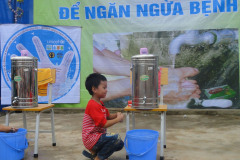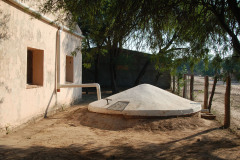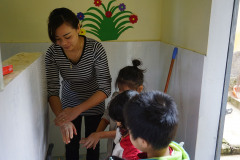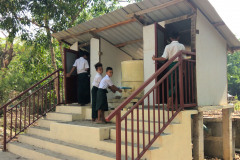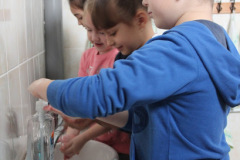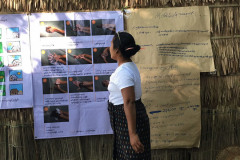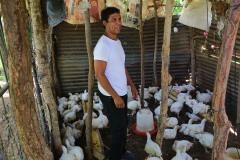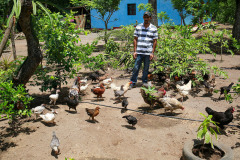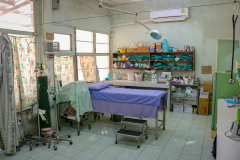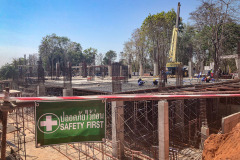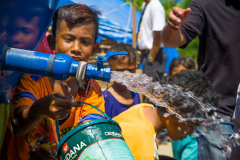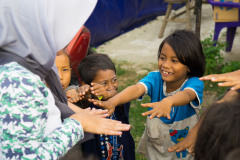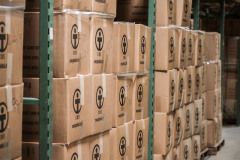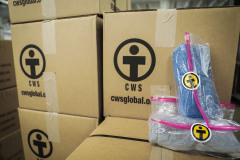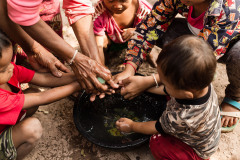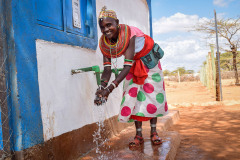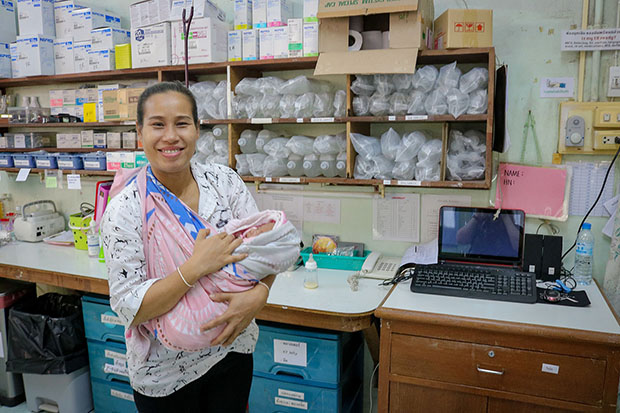These are troubling times. The global pandemic of COVID-19, or Coronavirus, has killed thousands of people. Countless people, including me, are living in areas where cases have been reported. Schools, restaurants, bars, churches….all closed. Stores are selling out of vital supplies. We’re doing everything we can to shelter our families and prevent the spread of the disease. We’re socially distancing. We’re praying, and we’re hoping.
(Get the latest on steps that CWS is taking to prevent the spread of Coronavirus here.)
Here’s something that gives me hope. Whether we knew it or not, our faithful supporters and partners have been helping our neighbors at home and in vulnerable communities that we work with around the world to prepare for a crisis like this one for decades. As an increasing number of neighbors are coming face to face with the pandemic, their armor is stronger because of all the work that we’ve been doing together.
 1. Handwashing information is part of many of our programs.
1. Handwashing information is part of many of our programs.
Washing your hands is a critical part of stopping the spread of germs. It helps to prevent all sorts of illness, from diarrhea to Coronavirus. And it’s a critical part of our sanitation and hygiene programs around the world! We’ve distributed 13,000 plastic hand fans to students in Vietnam that have information on them about how to properly wash your hands. Students took the fans home and shared the information with their families, amplifying the reach of this valuable information. We’ve hosted demonstrations and community events in Vietnam, Cambodia and Myanmar to help people learn about and practice thoroughly washing their hands. Want to learn more? Check out this blog called “Handwashing. We take it seriously!”
2. We’re helping our neighbors to obtain more water.
Water is a fundamental part of cleanliness and hygiene. It means that you can wash the food you’re going to eat, your clothes, your living space and, of course, yourself. Water access has been a key part of CWS programs and comes in all shapes and forms around the world. In arid parts of Argentina where women walk for water in 100+ degree temperatures, we’re helping families build systems to capture and store rainwater. In the water-scarce parts of Kenya, communities are building sand dams, water kiosks, weirs, pumps, water tanks and more. These systems can reduce a woman’s daily walk for water by huge margins. Check out this story of a community where the average walk for water dropped from 50 laps of a track down to just about one! And when an earthquake and tsunamis destroyed everyday life in Central Sulawesi, Indonesia, our CWS family was right there to deliver water to thousands of people every single day. Survivors were relieved to have water on hand to bathe, cook, clean…and just feel like people again. And as weeks turned to months after the disasters, we helped communities build sustainable water systems to replace lost infrastructure.
3. We’ve helped increase healthcare access for thousands of people.
During this pandemic, accessing medical care is critical. Over the years, many CWS programs have helped close the gap between vulnerable populations worldwide and the healthcare they need. In Jakarta, we host group homes for refugee children and women that help ensure that residents can visit hospitals and health centers when needed. Meet Farah, who was able to access medical treatment through a CWS home. In Paraguay, our program focuses on working with remote, indigenous communities to realize all their rights. This work has included teaming up with the Ministry of Health to make sure doctors can visit these communities. And along the Thailand-Myanmar border, we’re supporting the construction of an expanded Kwai River Christian Hospital. In its current location the hospital receives 20,000 visits each year; some patients are Thai and live near the hospital, and some are refugees from Myanmar who live in a nearby refugee camp. And around the world, CWS programs support parents of young children, including new moms, as they ensure that their children have the nutrition they need to grow healthy and strong.
4. We’ve been preparing for disasters.
Our program teams work with communities during every stage of the disaster cycle, from preparation and mitigation all the way through response and long-term recovery. We team up with communities worldwide to build resilience in areas that are prone to earthquakes, flooding, landslides and other emergencies. This work includes many steps that can also be used to respond to a pandemic. For example, we’ve worked with communities to get organized, make sure everyone is accounted for, improve access to the news and the flow of information, and stock up on critical supplies. Here’s what this looks like in Kyauk Tan village in Myanmar, where we also helped build a sturdy concrete jetty for easy boat launching so that people who are sick can be easily taken to a hospital.
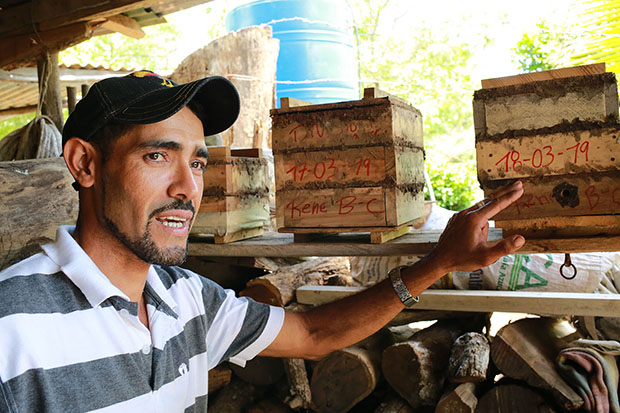
René Bermúdez and his neighbors are raising stingless melipona bees through a CWS-supported program. They can sell the honey as an additional source of income.
5. We’ve been building resilience through diversification.
No matter where you live in the world, getting sick can wipe out your savings. So can a bad harvest or a plague like locusts or coffee rust. That’s why we focus on building and diversifying livelihoods. For Emilio in the Dominican Republic, having chickens and eggs to sell helped him get through a year marked by floods and then drought. Amani, a Congolese refugee in Tanzania, started selling soft drinks after taking a CWS-supported business class in order to supplement what he earns by collecting and selling antiques. And in Nicaragua, we’ve been teaming up with 220 families to plant new types of crops and find new ways of earning extra money like raising chickens or stingless bees.
6. Our warehouses are stocked with hygiene supplies, ready to answer the call when it comes.
We ship out tens of thousands of CWS Hygiene Kits each year to neighbors around the world. Each package of supplies includes, among other things, a bar of soap and a washcloth. We have already gotten requests for CWS Hygiene Kits from community organizations that are responding to COVID-19. For vulnerable populations who may not have these supplies, a hygiene kit can mean the ability to wash hands and prevent the virus’s spread.
——
It’s easy to feel hopeless, but there are so many reasons to find hope again. These are six of them. But there are also countless people worldwide who are doing extraordinary things right now to keep everyone safe. I’m so grateful for everyone who is going out of their way to wrap their neighbors in love right now (from a safe distance, of course).
A lot of things in life are paused right now. Having hope doesn’t have to be one of them.
Laura Curkendall is the Director of Program Communications based in Washington State in the United States of America.

